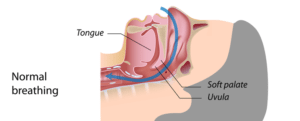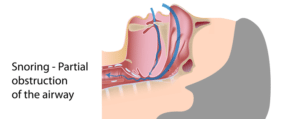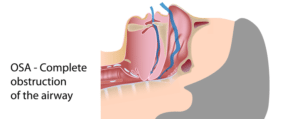What is Sleep Apnoea, Are you at Risk?
An obstruction can last up to 2 minutes and may occur several hundred times during a nights sleep. Although the sufferer is unaware, the brain recognises low levels of oxygen during these episodes and alerts the body to wake and take a breath.
These episodes may occur hundreds of times during the night. The sufferer is not fully roused by these events and in the morning will be unaware of any disturbances to their sleep.
The brief wake-ups that people with OSA experience diminishes their quality of sleep, resulting in sleep deprivation. The symptoms of sleep deprivation may be what bring most people with OSA to see their physician.
Normally during sleep, the muscles which control the tongue and soft palate hold the airway open.

Healthy upper airway
If these muscles relax, the airway narrows, causing snoring and breathing difficulties.

Partially obstructed upper airway
If these muscles relax too much, the airway can become completely blocked, preventing breathing.

Obstructed upper airway
Who is at risk of developing Obstructive Sleep Apnoea? The Strongest Risk Factors are :
- Male Gender – Males are 3-4 times more likely than females to develop OSA
- Obesity – In association with increased neck circumference
- Ageing – OSA can occur at any age but is more prevalent in the over 40’s age group
- Other risk factors include – upper airway abnormality, a recessed chin, nasal problems and family history
What are the Symptoms of Obstructive Sleep Apnoea? A sufferer may experience :
- Excessive Daytime Sleepiness
- Snoring
- Poor Concentration
- Lack of Energy
- Irritability
- Being Overweight
- Not Feeling Refreshed in the Morning
A Partner May Report:
- Heavy Snoring
- Cessation of breath followed by a loud gasp
Effects On Health and Wellbeing :
During an obstruction, air is unable to reach the lungs resulting in low levels of oxygen reaching the heart. This increases the heart rate putting strain on the heart having an impact on overall health. This could cause:
- Increased Risk of Stroke
- Increased Risk of Heart Attack
- High Blood Pressure
- Lack of Motivation / Concentration
- Depression
- Sexual Problems
- Morning Headaches






